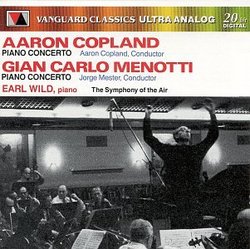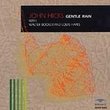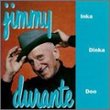| All Artists: Copland, Menotti, Wild, Symphony of Air Title: Piano Concerti Members Wishing: 0 Total Copies: 0 Label: Vanguard Classics Release Date: 2/28/1995 Genre: Classical Styles: Chamber Music, Forms & Genres, Concertos, Historical Periods, Classical (c.1770-1830), Modern, 20th, & 21st Century, Instruments, Keyboard Number of Discs: 1 SwapaCD Credits: 1 UPC: 723918000329 |
Search - Copland, Menotti, Wild :: Piano Concerti
 | Copland, Menotti, Wild Piano Concerti Genre: Classical
Both Copland and Menotti seldom wrote in the concerto format and the first concerto they each wrote were for piano. (Copland's second concerto was for Benny Goodman in 1948.) Copland's Concerto for Piano and Orchestra is... more » |
Larger Image |
CD DetailsSynopsis
Amazon.com Both Copland and Menotti seldom wrote in the concerto format and the first concerto they each wrote were for piano. (Copland's second concerto was for Benny Goodman in 1948.) Copland's Concerto for Piano and Orchestra is an early composition (1927) and in it you can hear the young composer's interest in jazz as well as a heavy influence of the bluesy side of Gershwin. This isn't the Copland everyone knows, but still worth your time. Gian Carlo Menotti's Concerto in F for Piano and Orchestra (1945) shows, in the piano, the influence of Scarlatti, bubbly as it is. Minor works, both, but fun. --Paul Cook Similar CDs
|
CD ReviewsCopland wonderful, Menotti virtuosic R. Heubel | Battle Creek MI | 07/19/2007 (4 out of 5 stars) "The Copland piece is classic Copland, melodic, rhythmic with wonderful, grand chords. The only problem with the Copland piece is that it is too short - only two movements!!!... but hey... you can't have everything. The Menotti piece is more focused on the piano solo, which is very enjoyable." Two enjoyable compositions, great 1961 sonics, and a great i Discophage | France | 06/21/2009 (5 out of 5 stars) "Only one other case comes to mind of a composer recording his own Concerto once as soloist and once as conductor: and, appropriately, it is Leonard Bernstein. The Boston Symphony Orchestra has released the live recording of the world premiere of "The Age of Anxiety" (actually Bernstein's "Symphony No. 2 for piano and orchestra"), made on April 9, 1949, Koussevitzky conducting and the composer at the piano, in a mammoth 12-CD box devoted to the Broadcast Archives 1943-2000 (Boston Symphony Orchestra - Symphony Hall Centennial Celebration, From the Broadcast Archives 1943-2000); and of course Bernstein recorded it as conductor not only once but three times: twice with Lukas Foss (in 1950 for CBS, Bernstein: Symphony No. 2; Serenade after Plato's Symposium, and in 1977 for DG, Bernstein: Chichester Psalms; Symphonies Nos. 1 & 2) and once with Philippe Entremont (in 1965, Bernstein Century - Symphony No. 1 "Jeremiah" & Symphony No. 2 "The Age of Anxiety").
I say "appropriately", as it is Bernstein who acted as conductor for Copland the pianist in their 1964 recording of the latter's Piano Concerto (The Copland Collection: Early Orchestral Works, 1922-1935). And Bernstein would indeed appear to be ideally suited to that work: not only because he embraced the piano music of Copland early on, playing the Piano Variations at private parties in the 1940s and making a famous recording of the Sonata in 1947 (Leonard Bernstein: The Early Years), but also because the famous second movement of the Piano Concerto, in which Copland tried his hand at out-jazzing Gershwin, strikes me as a unique case of "Bartok meets West-Side Story". But, three years earlier, with The Symphony of the Air (Toscanini's former NBC SO), it is the baton that the composer wielded, with Earl Wild at the piano. And it is a great version, that I prefer even to the 1964 remake. In the Piano Concerto, composed in 1926 at the behest of Koussevitzky (another apt link with Bernstein), Copland essayed a certain kind of vernacular language - Symphonic Jazz - which he subsequently abandoned, in favor of this other kind of vernacular which became his trademark: his epic and pastoral "prairie style". Interestingly, harbingers of that later style can also be heard in the Concerto's first movement, which alternates epic fanfares and such more pastoral moments. As for the Jazzy second movement, mind you, Copland's Jazz is far more radical than Gershwin's. It integrates the rhythmic and melodic parameters of the Jazz language into harmonic, symphonic and pianistic structures that are entirely contemporary - 1926 contemporary, that is. In fact, I hear in Copland's Piano Concerto striking echoes of Bartok's Second Piano Concerto, the vernacular Jazz replacing Bartok's Hungarian folk-music. Consequently that second movement, while, for today's ears, very accessible and "populist", is more angular, disjointed, rambunctious and even unruly than anything Gershwin ever wrote: more like Bernstein's West-Side Story Dances, really. Why did Copland abandon that style? I haven't researched, but possibly because he felt that the Jazz language retained too strong a personality and identity to coalesce convincingly into these classical music symphonic structures. Still, the Piano Concerto is a highly enjoyable piece, and the more I've listened to it, the more I've enjoyed it; and what I enjoy is that it is not just Jazz - it is Jazz meets Bartok; it is its very angularity, disjointedness and rambunctiousness - quite possibly what the Boston audience rejected in 1927. Back to Copland as conductor, in 1961, and the reasons for my enthusiasm: sure, the Symphony of the Air sounds cruder than the NYPO under Bernstein, and there is a certain spot in the first movement, introducing the coda at 5:50, where Copland lacks bite. But in that same movement Wild and Copland favor more forward-moving tempos than Copland and Bernstein (especially in the returning fanfare at 4:00 the end of the movement, where Bersntein is really pedestrian), and I prefer it that way: the movement doesn't get bogged down and sentimental, less epic and grandiose but more urgent and searingly lyrical. At 2:57 in the Jazzy 2nd movement there is a short dialogue of trumpets that the Symphony of the Air players play more tentatively than the Newyorkers. On the other hand Bernstein takes the passage starting at 1:48 with more bonhomie and less verve than Copland. Other than that, both conductors drive their respective orchestra have the required verve, dynamism and rambuctiousness. But the pianist makes the difference. As good and idiomaticas Copland is as pianist, he is surpassed by Earl Wild, whose muscularity and bigger sound pulls the Concerto in the direction of Bartok's 2nd Piano Concerto, an entirely convincing option I find, underlining as it does the modernism of the work. The little cadenza at 5:16 in the 2nd movement has an irresistible drive. This is not said to diminish the merits of the remake. It is a great version, but if anything this one is even greater, and the sonics are even more vivid and present. I shouldn't like Menotti's Piano Concerto. Like all I've heard of him, it gives you the impression that you've all heard it before and elsewhere. Here, it is a mixture of Poulenc and Prokofiev. Still, within those limitations which make it hardly original and memorable, I find it very enjoyable, with some uplifting moments in the brash and dynamic outer movements, and some beautiful tunes in the middle, slow movement. I'm not sure I'd be happy to pay to hear this in actual concert - I'd rather have the originals, Poulenc's or Prokofiev's 3rd, or hear the pianist trying his mettle at Barber's - but on CD it is very enjoyable. The 1961 sonics are stupendously good - more vivid and present than those afforded by the digital process to Michael Tilson Thomas 35 years later (Copland the Modernist). The only drawback of this disc is the short TT of 49:25, straight from the LP. A recording of Barber's Piano Concerto would have made an ideal complement, or else of Gershwin's Piano Concerto or Rhapsody in Blue. Granted, Vanguard's bid at a coherent filler was limited by the fact that Wild did very few recordings for them, and the rest is of virtuoso solo pieces. He made a number of recordings of the Gershwin pieces for other labels, but never recorded Barber's PC. " |

 Track Listings (5) - Disc #1
Track Listings (5) - Disc #1
